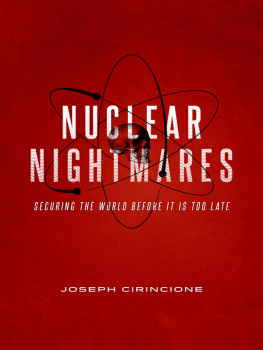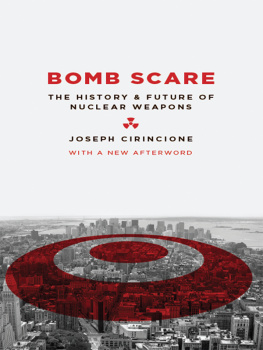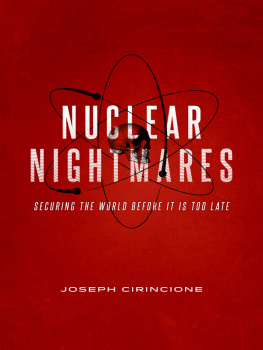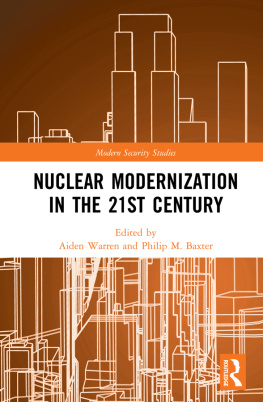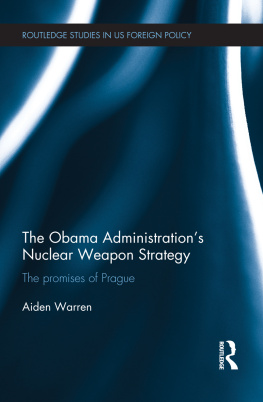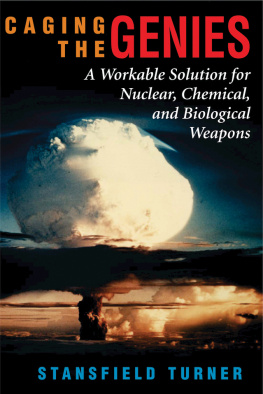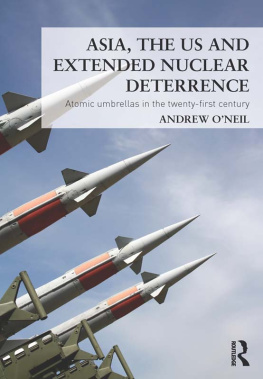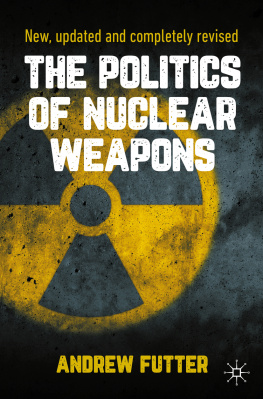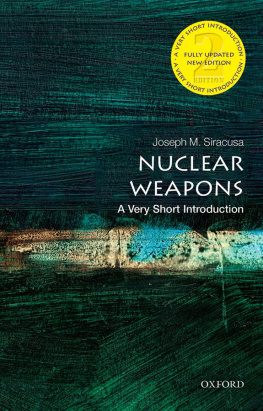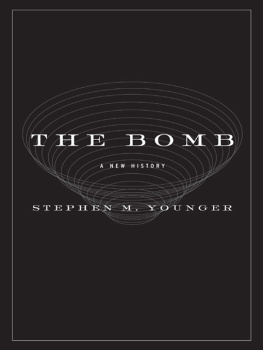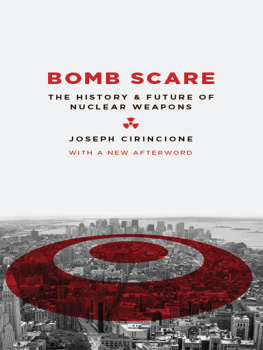NUCLEAR NIGHTMARES
NUCLEAR NIGHTMARES
SECURING THE WORLD BEFORE IT IS TOO LATE
JOSEPH CIRINCIONE
COLUMBIA UNIVERSITY PRESS NEW YORK
COLUMBIA UNIVERSITY PRESS
Publishers Since 1893
New York Chichester, West Sussex
cup.columbia.edu
Copyright 2013 Columbia University Press
All rights reserved
E-ISBN 978-0-231-53576-2
Library of Congress Cataloging-in-Publication Data
Cirincione, Joseph.
Nuclear nightmares : securing the world before it is too late / Joseph Cirincione.
pages cm
Includes bibliographical references and index.
ISBN 978-0-231-16404-7 (cloth : alk. paper) ISBN 978-0-231-53576-2 (e-book)
1. Nuclear nonproliferation. 2. Nuclear terrorismPrevention. I. Title.
JZ5675.C57 2013
327.1 747dc23
2013026169
A Columbia University Press E-book.
CUP would be pleased to hear about your reading experience with this e-book at .
JACKET & BOOK DESIGN: VIN DANG
References to websites (URLs) were accurate at the time of writing. Neither the author nor Columbia University Press is responsible for URLs that may have expired or changed since the manuscript was prepared.
We simply cannot allow the twenty-first century to be darkened by the worst weapons of the twentieth century. It took decadesand extraordinary sums of moneyto build those arsenals. Its going to take decadesand continued investmentsto dismantle them. Its painstaking work. It rarely makes the headlines. But I want each of you to know missile by missile, warhead by warhead, shell by shell, were putting a bygone era behind us. Were moving closer to the future we seek. A future where these weapons never threaten our children again. A future where we know the security and peace of a world without nuclear weapons.
PRESIDENT BARACK OBAMA, WASHINGTON, D.C. | DECEMBER 3, 2012
CONTENTS
Of all the challenges we face, individually, nationally, and globally, only two threaten catastrophe on a planetary scale: global warming and nuclear weapons. Both threats stem from machines that we have made. Both are preventable, even reversible. But to do so, both require new leadership and new ways of thinking.
This book tries to provide a greater understanding of the current threats these weapons represent and the efforts to reduce and eliminate these dangers. In my previous book, Bomb Scare: The History and Future of Nuclear Weapons, I provided a primer on the technology and development of nuclear weapons and explained why countries choose to have nuclear weapons or choose not to. In two editions of Deadly Arsenals: Nuclear, Biological, and Chemical Threats, my coauthors and I gave detailed descriptions of the nuclear weapon programs in the nations that had them, past and present.
I try not to repeat myself here. My purpose is to provide some understanding of the spread of nuclear weapons ().
This book, however, is in large part a story about the debate surrounding the nuclear policy of the Obama administration. I actively participate in this debate as an analyst and as the president of Ploughshares Fund, a global security foundation focused on nuclear weapons policy. I try to tell the story honestly as I see it unfolding: the promise, the successes, the failures, and the possibilities of moving toward what President Obama termed the peace and security of a world free of nuclear weapons.
When President Barack Obama assumed office in 2009, he was determined to reboot Americas national security strategy, including modernizing an outdated U.S. nuclear weapons policy. He entered the White House with the most comprehensive, detailed nuclear plan of any president in history, including policies to end the testing of nuclear weapons, end the production of material for weapons, rapidly reduce existing arsenals, and make the goal of eliminating all nuclear weapons a central element in our nuclear policy. As a member of his campaigns nuclear policy team during 2007 and 2008, I played a small role in developing that plan. It was visionary, practical, and tough.
But the secret of the plan was that it was not really his plan. The proposals flowed from a nonpartisan consensus that had developed among the core of Americas security elite over the past decade. Many senior strategistsincluding many former cabinet members and military chiefs who had guided the build-up of the vast nuclear weapons complexnow believed that it was time to reduce that complex. Most believed nuclear weapons represented the greatest threat to our nation and to many other nations. They concluded that the country could be made safer and more secure by moving step-by-step to reduce and ultimately eliminate these arsenals.
The American people feel the same way. Poll after poll reaffirms public support for the elimination of nuclear weapons provided that it is done carefully, mutually with other nations, and verifiably. People are understandably skeptical about the feasibility of actually eliminating all nuclear weapons, but they are overwhelmingly in favor of steps to advance toward that goal. A 2004 poll by the Program on International Policy Attitudes showed that 87 percent of Americans were in favor of a treaty prohibiting nuclear weapons test explosions worldwide.
Previous presidents have wanted to reduce and eliminate nuclear weapons, even during the Cold War. John F. Kennedy warned, The weapons of war must be abolished before they abolish us. When confronted with the realities of our nuclear war plans, almost every president at some point turned to his advisors and asked Why do we have so many of these weapons?
The end of the Cold War and the increase in the threat of catastrophic terrorism swelled the ranks of those who believed that the liabilities now vastly outweighed whatever benefits nuclear weapons may have had in the past. Many of the cabinet officers and ambassadors from previous Republican and Democratic administrations joined together in articles, op-eds, conferences, and reports to craft the ideas President Obama carried into the White House. Major foundations provided millions of dollars in grants to support these efforts, including Ploughshares Fund.
The emerging consensus was epitomized in part by the 2004 and 2008 presidential campaigns. In the September 2004 debate between President George W. Bush and his challenger, Senator John Kerry, when asked what was the single greatest threat to the United States, both answered nuclear terrorism, although they disagreed on the best strategy for confronting that threat.
The new president was deeply committed to this issue, as was Vice President Joe Biden and several of their senior national security staff. In April 2009, in Prague, the capital of the Czech Republic, President Obama gave his first foreign policy speech. He chose nuclear policy as his premier issue. The plan the newly inaugurated president unfolded had integrated three key nuclear security initiatives: reduce, prevent, and secure: reduce the U.S. and Russian arsenals; prevent new states from getting nuclear weapons; and secure all loose nuclear materials to block terrorists from building a nuclear bomb.

